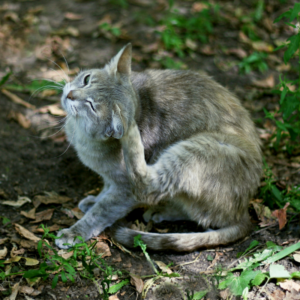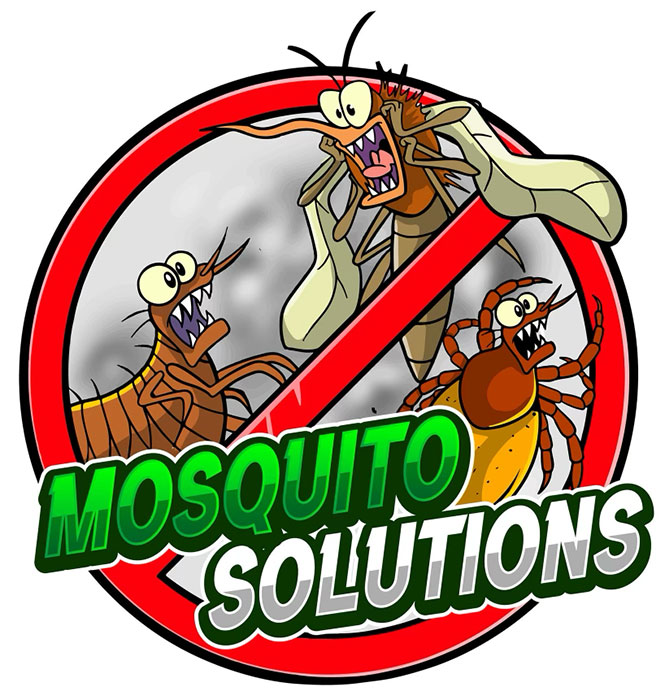Nobody likes fleas or ticks. And the idea of these tiny parasites taking residence on your beloved dog or cat is disheartening – as it should be. The truth is these little beasts can significantly affect the health and well-being of your fur babies.
Why are fleas and ticks so drawn to your dogs, cats, and other pets? Because they’re able to live by feeding on the blood of animals. That said, their bites often cause discomfort and skin irritation, and sometimes they can even transmit disease. No one wants their beloved pet to suffer which is why we here at Mosquito Solutions want to help you spot and prevent infestations before they can make your labrador sore.
The Harmful Effects of Fleas
When looking for a home, you and I take things into consideration like safety and having access to the things that we need. Well, fleas do the same thing – they look for a place to stay safer, warmer, and gain easy access to blood, making your pets prime real estate to these annoying pests.
 But these small wingless insects are not just annoying. In fact, they can cause a plethora of health problems for your pets. The most obvious sign that fleas have found a foothold on your pet is the intense itching that they cause. When you see your pet scratching at themselves more than normal, it could be that they have become the site for a new flea neighborhood.
But these small wingless insects are not just annoying. In fact, they can cause a plethora of health problems for your pets. The most obvious sign that fleas have found a foothold on your pet is the intense itching that they cause. When you see your pet scratching at themselves more than normal, it could be that they have become the site for a new flea neighborhood.
When a pet scratches themselves it becomes possible for them to break the skin which can lead to bacterial infections and dermatitis – and some pets can develop allergic reactions to fleas. This is known as Flea Allergy Dermatitis, or FAD, for short. This reaction can lead to hair loss and inflammation of the skin.
In addition to FAD, fleas can transmit diseases to our pets. The most common disease that fleas like to bestow upon their hosts is tapeworms. When pets groom themselves they can ingest fleas and accidentally ingest tapeworm larvae in the process.
Other diseases that can accompany a flea infestation is Bartonella. This bacterial infection causes fever, anemia, and extreme discomfort for pets. If you have a smaller breed of cat or dog, anemia can lead to severe weakness and lethargy.
The Harmful Effects of Ticks
Ticks are another parasite that feed on the blood of animals. They are known for their ability to easily spread various diseases. These tiny arachnids attach themselves to the skin of your pets and feed for extended periods of time. A tick bite carries the risk of your pet contracting Lyme disease, Rocky Mountain Spotted Fever, and Ehrlichiosis.
These diseases, most commonly spread through tick bites, cause a huge amount of discomfort and can lead to death if not treated. At the very least, your pet will experience joint pain, fever, lethargy, and loss of appetite. At its worst, however, failure of the heart, kidneys, and other organs are possible.
In addition to disease, ticks can cause anemia in pets, draining significant amounts of blood and leading to weakness and severely reduced energy levels. Tick paralysis is another concern. This takes place when certain species of ticks release toxins that affect the nervous system, resulting in muscle weakness, coordination problems, and in severe cases, respiratory distress.
Flea and Tick Prevention for Pets
Despite all the horrible things that come with fleas and ticks, you don’t need to fear because there are ways you can prevent these things from finding your pet. At Mosquito Solutions, we want to work with you to keep fleas away and your pets happy. Here are things you can do with (and without) us to make sure that fleas and ticks will flee from your property.
 Maintain a tidy home. Regularly vacuuming, mopping, disinfecting, and wiping down counters will remove places where fleas can hideout in your home. Making sure that food is not left out and dishes get washed in a timely manner will help this as well. Finally, make sure your pet’s bed is kept clean and free from shed hair.
Maintain a tidy home. Regularly vacuuming, mopping, disinfecting, and wiping down counters will remove places where fleas can hideout in your home. Making sure that food is not left out and dishes get washed in a timely manner will help this as well. Finally, make sure your pet’s bed is kept clean and free from shed hair.- Maintain a tidy yard. Fleas and ticks like to hide out in damp shady areas, long grass, and in piles of rotting sticks and leaves. Keeping your lawn mowed, bushes trimmed, low spots well drained, leaves raked, and debris picked up will help to keep these things at bay.
- Contact your veterinarian and use a flea/tick treatment for your pet. Your vet is concerned about the health of your pet, as well. They have topical solutions that can be applied to your furry friend that will deter fleas and ticks from using them for lunch.
- Have your yard professionally sprayed. At Mosquito Solutions we use natural flea and tick-killing sprays that are safe for your yard and pets – but deadly to pests. Our professionals will help you maintain a flea-less and tick-less yard and home that is comfortable for you and your pets.
Despite your best efforts, it is still possible to become host to a flea and tick infestation. Should you find yourself with these beastly squatters on your pet and in your home, all hope is not lost. There are treatments available for your pet and your veterinarian can help you determine the best course of action to remove them for good.
And once your pet is treated, a thorough cleaning of the environment is also called for. At Mosquito Solutions we can help you eliminate eggs, larvae, and adult fleas and ticks that may be hiding throughout your yard space.
Turn to Us for a Tick & Flea-Free Environment
Flea and tick prevention is not a one-time application or cleaning event. It is an ongoing process that can be crucial for your pet’s health and happiness – along with the rest of your household. The risks involved with fleas and ticks feeding off your pet is not worth taking.
Our team at Mosquito Solutions will work with you to make sure your home and your pets are free from the risks of fleas and ticks. Our natural, pet-friendly techniques will ensure a safer environment, so you and your pets can live with the highest possible quality of life. Call 631-528-2029 or book online to get started.

Recent Comments